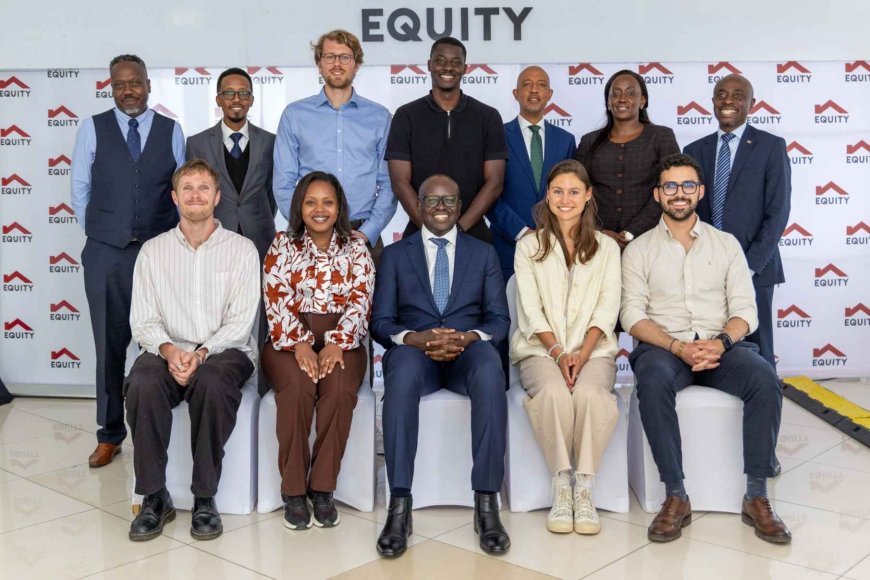Oxford University Visits Equity For Insights On Banking Business In Africa
Equity is now a centre of business excellence whose business model is a leading case study in many business schools around the world.

Delivering successful banking services and offering Integrated Financial Services across Africa requires a foundation built on well-trained human capital, sound governance structures and a commitment to global best practices and processes.
This was the message shared by Equity Bank Kenya Managing Director, Moses Nyabanda, as he addressed MBA students from Oxford University during their visit to the Equity Group Head Office in Nairobi, recognised as a centre of business excellence in Africa.
"Equity is leading the charge in expanding financial inclusion and access to Integrated Financial Services across East and Central Africa," said Nyabanda.
"From our humble beginnings as a Building Society over four decades ago, we have evolved into a formidable financial institution delivering a comprehensive suite of services. Our business model follows a tri-engine approach—economic, social and environmental sustainability—designed to drive positive impact."

Equity Bank Kenya Managing Director, Moses Nyabanda, poses for a photo with MBA students from Oxford University during their visit to the Equity Group Head Office in Nairobi. /HANDOUT
Nyabanda highlighted the Group’s structure, which operates across four key verticals: Banking, Insurance, Technology, and the Equity Group Foundation. He also spoke about the Group’s long-term vision, articulated through its strategic roadmap known as the Africa Recovery and Resilience Plan (ARRP).
“This Marshall Plan-inspired strategy aims to deliver lasting transformation for the continent, leveraging strategic partnerships with Development Finance Institutions (DFIs), global implementation partners, and social institutions. These collaborations enable us to deliver both social impact and commercial outcomes in a sustainable manner,” he noted.
During their visit, the Oxford students engaged with Equity executives on a variety of topics, from the bank's cutting-edge innovations to the broader dynamics of Kenya’s private sector. They were particularly drawn to Equity’s inclusive banking model and the social footprint of its operations.
Nyabanda elaborated on the Group’s goals under its Banking arm, focusing on empowering customers by building sustainable value chains and supporting business resilience. “We are a business and like all businesses, we aim to provide value to our shareholders, especially given the immense growth opportunities in this region,” he said.
He also explained Equity’s expansion into offering Integrated Financial Services, including insurance, to protect and support the financial well-being of its customers and communities. Through its Technology Group, Equity has emerged as an industry leader in innovation. “We use technology as a catalyst to drive wealth transformation and boost operational efficiency,” he continued.
Nyabanda emphasised the bank’s role in promoting financial access and inclusion, adding, “We simplified banking by removing barriers like stringent documentation and minimum balance requirements. Opening an account now only requires an ID. We eliminated withdrawal limits and notice requirements, making banking accessible to everyone."
He added that Equity invested in innovative distribution channels like agency banking and the Equity Mobile app to ensure services reach even the most remote areas.
Equity Group Associate Director of Innovation and Technology, Johnny Falla, spoke about the Equity Group Foundation and its efforts to uplift low-income communities. “Through a mix of financial tools, technology, and capacity building, we’re preparing Africans to thrive in the future,” stated Falla.
He also highlighted the Foundation’s programs in Education and Leadership, Enterprise Development and Financial Inclusion, Health, Agriculture, Energy and Environment, and Social Protection.
Alvin Okari, Managing Director of Finserve Africa, walked the students through the role of innovation in Equity’s mission, with a focus on Equitel. “Equitel allows people in remote areas to access banking services anytime, send and receive money, pay bills, apply for loans, and manage savings,” he explained.
“They can also make calls, browse the internet, and access vital information on health, education, and more—all through one platform.”
Okari noted that Equitel also supports environmental sustainability by operating as Kenya’s only telco without physical scratch cards and pioneering the launch of eSIMs, significantly reducing plastic waste.
Rising from a building society that survived insolvency in 1994 to rapidly growing and overtaking existing multinationals, Equity is now a centre of business excellence whose business model is a leading case study in many business schools around the world.
In addition, many business schools, organisations and institutions regularly visit the Group for benchmarking exposure to learn firsthand about the brand, its evolution and business strategy.







